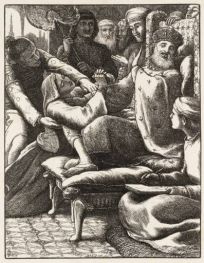
a sermon, based on Jeremiah 31.27-34 and Luke 18.1-8, preached with the people of Epiphany Episcopal Church, Laurens, SC, on the 22nd Sunday after Pentecost, October 16, 2016

John Donne, 17th century Anglican priest and poet, in perhaps his best known work, wrote: “…No man is an island, entire of itself; every man is a piece of the continent, a part of the main…any man’s death diminishes me, because I am involved in mankind, and therefore never send to know for whom the bell tolls; it tolls for thee…”[1]
Donne’s meditation on life and death following a grave illness also serves as a reflection on those universal aspects of human existence: individuality and communality…
We, with our individual histories and memories, thoughts and feelings, wants and needs, observations and opinions, perceptions and intentions, live in relation with others. We are “hard-wired” to belong. We always are in the act of joining, developing, and maintaining (sometimes tolerating!) community with one or many.
Often I’ve thought that if I was God, I would design life so that anything as necessary as breathing, which I believe relating to others is, would be easy to do. Alas, being in relationship, living in community can be wondrously energizing and woefully enervating; sometimes at the same time! Largely because it involves the constant interplay between our desire to be fully, authentically ourselves and our equally present need to be connected with others, who, no matter the similarities, always because of their individuality call us, challenge us to step outside of ourselves, to see life, the world, ourselves in different ways.
Amid this prevailing existential concern, Jeremiah speaks. Seeking to console a people exiled from their homeland, the prophet tells of a coming time of God’s renewal of their covenantal relationship; one characterized by an inward possession of God’s spirit through which individuals will be responsible for their behavior, no longer having their “teeth set on edge” accountable for the sins of others.

Our gospel passage illustrates this tension between individuality and communality in a different way. Jesus tells a parable, ostensibly about the necessity of perseverance in prayer. A cantankerous and callous judge grants justice to a widow, who, though the symbol of helplessness, wields the power of persistence. What appears to be a battle of two contestants is really the interplay between individual choice and corporate responsibility; the widow’s relentless demands compelling the judge to do his job for the sake of communal order.
Herewith, and perhaps this will strike you as an odd prologue, I request that we, each and all, consider making a financial pledge to support the life and labor, mission and ministry of Epiphany Church in 2017.
Today, we gather as living inheritors of the previous 170 years of Epiphany’s history; one marked by times of the feast of success in the growth of the congregation, the renovation of our worship space, and the addition of buildings and property and the famine of the struggle to keep the doors open, indeed, during the 19th century, the doors being closed for nearly ten years due to the lack of a priest to share ministry with very few people.
Today, we gather, I pray aware, alert to our continued possibilities. Not because of me. Rather because of you. For you, as individuals, many of you present and active for years, have come and do come to form a community whose spirit, as God’s Spirit written on your hearts, is one of love and respect, welcome and acceptance.
Today, we gather, looking beyond this day into the future. There’s an old saying that the gospel is free of charge, but there’s a cost to proclaim it. Yes, Jesus, a peripatetic preacher, always on the move, declared to a potential follower: “Foxes have holes, the birds of the air have nests, but I have no place to lay my head.”[2] Yet we, Epiphany, are responsible for the care of ourselves and the maintenance of our space and accountable to our larger communities of Laurens and our diocese. Our faithful stewardship of all of it requires money.
Still, my request for our money, transcending solely earthly considerations, is fraught with the tension between our individuality and communality, our singular being and shared belonging, our personal care for ourselves and mutual concern for one another. Nothing quite stirs that tension, asking us to contemplate afresh where the balance is, than the call to spend our money. For this, far more than a practical matter of adding and subtracting dollars and cents, is a spiritual expression of what we value and where we find our hearts.
This, therefore, is a hyper-sensitive matter. Therefore, I – unlike the widow who, according to the Greek[3] demanded justice by threatening to punch the judge in his eye until, by her force and his fear, he submitted – simply ask each of us to make a pledge.

Photographs: me preaching at The Washington National Cathedral, Friday, January 27, 2006 (by Walt Calahan); alms basin, Epiphany Episcopal Church, Laurens, SC; the inscription (read counterclockwise): “It is more blessed to give than to receive” (Acts 20.35).
Illustration: The Unjust Judge and the Importunate Widow, John Everett Millais (1829-1896)
Footnotes:
[1] From Meditation XVII of Devotions upon Emergent Occasions, John Donne (1572-1631)
[2] Luke 9.58, my paraphrase
[3] The word hypōpiazein (as the judge says: “I will grant her justice, so that she may not wear me out”) literally means “to hit under the eye”.
